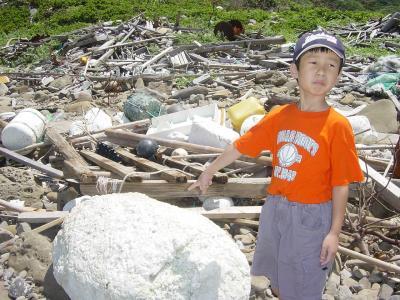Decomposing ocean plastic produces toxic chemicals
In the first study to look at what happens to the billions of tons of plastic waste floating on the ocean over the years, scientists have reported that plastic, the material that is believed to be very sustainable, decomposes. with amazing speed and discharging hazardous substances into sea water.
Reported before the national conference of the 238th American Chemical Society, researchers described this as a surprising finding. In the past scientists have always believed that ocean plastic not only lost sight, but also a threat to marine creatures mistaking it for food or being trapped in it.
'Plastics in daily use are still generally considered stable,' said Dr. Katsuhiko Saido, lead researcher. 'But we found that ocean plastic actually decomposes when it comes in contact with sun and rain and other environmental agents, adding to the risk of future pollution.'
Every year there are about 150,000 tons of plastic chips, mostly in the form of Styrofoam, drifting to the coast of Japan, Saido said. More and more garbage, mostly plastic garbage, floating or sinking into the ocean. 'Pacific Giant Bunker' located between California and Hawaii is about twice the size of Texas and includes mostly broken plastic.
 A boy in Japan pointed to a piece of plastic chips coming from the ocean. (Photo: Katsuhiko Saido)
A boy in Japan pointed to a piece of plastic chips coming from the ocean. (Photo: Katsuhiko Saido)
Saido, a chemist from Nihon University, Chiba, Japan, said his team found that when the plastic decomposes it releases bisphenol toxic substances (BPA) and oligome PS, causing pollution in the sea is even more serious. Plastic usually does not dissolve in the body after swallowing. However, substances produced from biodegradable plastic are absorbed by the body and cause many harmful effects. BPA and oligome PS are major concerns because they can disrupt the activity of hormones in the animal body and seriously affect the reproductive system.
A number of previously conducted studies have also shown that exposure to small amounts of BPA generated from plastic bottles and bottles can have adverse health effects.
Saido recounted a new way to describe the breakdown of plastic products at low temperatures, such as in the ocean. This process involves modeling room-temperature plastic decomposition, removing heat from the resin and then using a liquid to extract PS BPA and oligome. Usually, Styrofoam is broken down into debris in the ocean. But when the research team disintegrated the plastic, they discovered three new compounds that were not found in nature. They are styrene mono (SM), styrene di (SD) and styrene tri (ST). SM is known to cause cancer, while SD and ST are also suspected of having similar effects. BPA and PS are not found in nature, they are produced through the breakdown of plastics. ST produces SM and SD when decomposed because of heat, so ST is also a threat to living organisms.
Funding for the research program of the Saido group is granted by Nihon University.
- Don't inject plastic bottles to reuse many times, incalculable hazards
- The ocean is called for by biodegradable plastic
- Plastic bottles also cause obesity and diabetes
- Test of dolphins, unexpectedly found the most terrible chemicals ever
- Chemical substances 'not strange' cause gender change
- Video: The toxic effects of room sprays
- How is the earth if plastic bags disappear?
- The revolution is expected by the world: Plastics can be recycled into CO2 and water
- Chemicals in plastic can cause weight gain
- 269,000 tons of contaminated plastic floated on the ocean
- These are the 5 most horrible chemicals in history
- Risk of poisoning from plastic chopsticks and wooden chopsticks
 Surprised: Fish that live in the dark ocean still see colors
Surprised: Fish that live in the dark ocean still see colors Japan suddenly caught the creature that caused the earthquake in the legend
Japan suddenly caught the creature that caused the earthquake in the legend A series of gray whale carcasses washed ashore on California's coast
A series of gray whale carcasses washed ashore on California's coast Compare the size of shark species in the world
Compare the size of shark species in the world